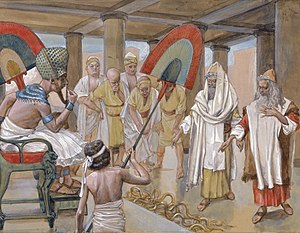 Image via Wikipedia
Image via WikipediaThis time, when Moses and Aaron went to talk to Pharaoh, Moses knew that God had empowered him with His abiding presence and strength. The two initial miracles of the staff becoming a snake and the water turning to blood were instrumental in bolstering Moses' faith in God as they were necessary to show Pharaoh a supernatural power speaking for the Israelites. As Moses spent more time with God, he focused less on his own shortcomings and more on God's strength and committment to His people Israel. Moses exchanged his fear for faith and was able to boldly make his repeated demands before Pharaoh. He no longer worried about what anyone thought of him. He knew that he had a relationship with the God of Abraham and nothing could be as powerful as that.
Each plague successively challenged and defeated a related Egyptian deity ( Nile to blood - Isis, goddess of the Nile; Frogs - Heqet, goddess of birth with a frog head; Gnats - Set, god of the desert; Flies - Uatchit, god represented by fly and Re, a sun god; Death of livestock - Hathor - goddess with a cow head and Apis, a bull god, symbol of fertility; Boils - Sekmet, goddess with power over disease and Isis, goddess of healing; Hail - Nut, sky goddess; Locusts - Osiris - god of crops and fertility; Darkness - Re and Horus, sun gods; Death of Firstborn - Pharaoh's firstborn son, a god, and Min, god of reproduction). While demonstrating God's absolute authority and power over creation, the plagues did not afflict any of the Israelites or their land in Goshen.
Even though God specifically singled out Pharaoh, it appears to me that God was really addressing everyone who refused to believe that God is Sovereign and that there is no God like the God of the Hebrews in all the earth (Exodus 9:14). In these chapters of Exodus, God revealed Himself as Omnipotent and as existing outside of time. The numerous Israelites who earlier grumbled against Moses and Aaron because of their increased workload also had to understand that their god was The God of the Universe, and not just some pagan deity; that Moses and Aaron were their spiritual leaders who had to be honored because the God of Abraham, Isaac, and Jacob had talked to them and appointed them to this job; that the God of their Fathers was indeed a God to be reckoned with - a God to be feared and held in reverence.
reference material: The Bible Knowledge Commentary: An Exposition of the Scriptures by Dallas Seminary Faculty, Old Testament, John F. Walvoord and Roy B. Zuck, editors, Cook Communications

No comments:
Post a Comment